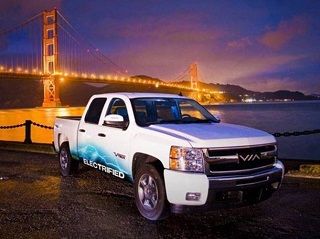Range-Extended Electric Trucks – Is There Potential There?

VIA (pictured here) employs a streamlined second-stage manufacturing process to integrate its proprietary V-DRIVE™ power train into new OEM vehicles, then sell directly to fleets under the VTRUX brand name. VIA VTRUX deliver up to 40-mile battery range and unlimited extended range, averaging more than 100 mpg in typical daily driving.
I recall moderating a panel discussion at the 2009 Alt Car Expo in Santa Monica, CA, and, from then until now, I’ve had literally hundreds of conversations on the subject of range-extended EVs vs. pure battery EVs. Even after all these years/discussions, I never really drank the Koolaid re: RE-EVs. Obviously, I see the general customer value proposition, but I’ve never believed that there was a sufficiently large market window here. And now, going into 2015? Wow. I really don’t see it.
Even if the entire design, bill of materials, etc., is totally without compare (which is hard to believe), let me point out:
• As the electric-only range continues to improve and fast-charging stations become ubiquitous, RE-EVs become increasingly irrelevant.
• There are 25 million single-family, multi-car homes in the U.S. alone where one car is on the road less than 50 miles per day, i.e., no need for range-extension.
• Until coal ceases to be the least-expensive form of baseload electricity, there is no eco-benefit to EVs generally. (I’ll grant that most people don’t understand that.)
• RE-EVs are by definition expensive, insofar as they require the consumer to purchase (and drag around) two independent sources of energy.
• Some people will be impressed that Bob Lutz is a founder, but I’m not among them. Of course he wants to convince the world that his involvement in this 100 MPG masterpiece means that he is a sincere advocate for eco-friendly transportation (check out the video and be prepared to be amazed!), and I have to admit that the man can sell an Eskimo ice; he’s in a class by himself in that respect. But anyone who believes him is something of a chump (sorry to be so blunt). Think of all the time and resources (through an auto career that began in 1963) he’s had to make accomplishments in this direction, and then realize where GM is today, more than half a century later, with its dazzling array of eco-obscenities like the Escalade, the Camaro, and the rest.
Indeed, Lutz’ presenting himself as an advocate for the environment is outrageous. After all, he’s largely responsible for resurrecting the Fisker Karma, not as a RE-EV, but as a gas-guzzler muscle car. Last year he wrote, “Some ‘greenies’ are already hyperventilating on blogs over the obscenity of converting an ‘earth-friendly’ electric car to gas. What they don’t realize is that their fanatical all-organic-tofu enthusiasm isn’t shared by the bulk of the luxury-car buying public.”
I’m not fanatical, and I’m not hyperventilating; I’m simply observing the obvious: Lutz is a man tragically born without a conscience.
My advice, since you asked for it, is, a ) I believe the product is a non-starter, and, more importantly, b) I know for a fact that your integrity is worth a great deal more than selling a few trucks.

Craig,
There are times when I am simply at a loss for words.
You have acknowledged, repeatedly, that EV’s are worse for the environment than efficient gasoline vehicles in most electric grids (I’m being generous in drawing back to “most” just so we don’t have to get mired in the minutiae again… but you know that I hold this to be true for “all” U.S. grids).
But though you acknowledge this to be true… you then attack the ER-EV because it’s not full EV.
The EV is the worse-emitting portion of its engineering, and the criticism here is that it includes the possibility of less environmentally-damaging driving modes.
The Chevy Volt does less damage to the environment if it’s filled with gasoline and run as a lower-efficiency hybrid than it does if you plug it in… The same would be true with this crazy truck idea.
The truth is there is a massive advantage to using an electric motor drive for a truck – because the torque loss at low gears in a typical transmission is deplorable, and any truck used as a truck (rather than a two-seater car with poor aerodynamics) is going to be spending a lot of time accelerating heavy loads in low gears.
But we still don’t want the thing plugged in for several decades until we can purge coal off of the grid and clean up the natural gas system quite a bit…
So, the ideal way to design this truck would have 4 ea of 40 KW electric motors (one driving each wheel – this would maximize the potential brake recovery and eliminate all axles and gears), a smallish (~3-4 kWh) Li-ion battery, and a 100 kW micro-turbine generator… and a 25 gallon gas tank. I don’t know if that can be made economically. I suspect that it would be because you are eliminating the transmission at large, and all axles and gears – good riddance – and I believe that cost of 4 40 KW motors is less than the cost of 1 190 kW motor, and the wiring is easier for lower power loads, even if you do have to wire them up… But regardless of the final cost, that is the most environmentally sound design.
We should forego the idea of a plug until it starts being a net positive rather than a net negative on an environmental basis.
I suppose you’re right that though I mentioned in the article the environmental validity of EVs generally, I didn’t make a big deal of it. Here’s a piece expressing my beliefs on the subject in more detail: http://2greenenergy.com/2014/12/01/environmental-electric-vehicles/.
The guy asked for my viewpoint on the product’s marketability, so I tried to confine my responses to that narrow subject.